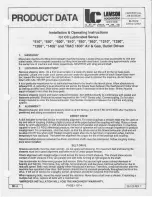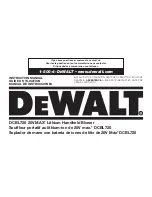
Page
21
/
78
power source and/or battery pack, picking up or carrying the tool. Carrying power tools with
your finger on the switch or energising power tools that have the switch on invites accidents.
d)
Remove any adjusting key or wrench before turning the power tool on. A wrench or a key left
attached to a rotating part of the power tool may result in personal injury.
e)
Do not overreach. Keep proper footing and balance at all times. This enables better control of
the power tool in unexpected situations.
f)
Dress properly. Do not wear loose clothing or jewellery. Keep your hair, clothing and gloves
away from moving parts. Loose clothes, jewellery or long hair can be caught in moving parts.
g)
If devices are provided for the connection of dust extraction and collection facilities, ensure
these are connected and properly used. Use of dust collection can reduce dust-related hazards.
4) Power tool use and care
a)
Do not force the power tool. Use the correct power tool for your application. The correct
power tool will do the job better and safer at the rate for which it was designed.
b)
Do not use the power tool if the switch does not turn it on and off. Any power tool that cannot
be controlled with the switch is dangerous and must be repaired.
c)
Disconnect the plug from the power source and/or the battery pack from the power tool
before making any adjustments, changing accessories, or storing power tools. Such preventive
safety measures reduce the risk of starting the power tool accidentally.
d)
Store idle power tools out of the reach of children and do not allow persons unfamiliar with
the power tool or these instructions to operate the power tool. Power tools are dangerous in the
hands of untrained users.
e)
Maintain power tools. Check for misalignment or binding of moving parts, breakage of parts
and any other condition that may affect the power tool’s operation. If damaged, have the
power tool repaired before use. Many accidents are caused by poorly maintained power tools.
f)
Keep cutting tools sharp and clean. Properly maintained cutting tools with sharp cutting edges
are less likely to bind and are easier to control.
g)
Use the power tool, accessories and tool bits etc. in accordance with these instructions,
taking into account the working conditions and the work to be performed. Use of the power tool
for operations different from those intended could result in a hazardous situation.
5) Service
a)
Have your power tool serviced by a qualified repair person using only identical replacement
parts. This will ensure that the safety of the power tool is maintained.
b)
Have your tool repaired by a qualified person. Any protective guard or other part that is
damaged should be properly repaired or replaced by an authorized service centre unless otherwise
indicated in this instruction manual.
This electric tool complies with the relevant safety rules. Repairs should only be carried out by
qualified persons using original spare parts; otherwise this may result in considerable danger to the
user. The use of unauthorized parts or failure to follow the maintenance instructions may result in
injury or damage.
c)
Maintain tools with care. Keep cutting tools sharp and clean for better and safer performance.
Follow instructions for lubricating and changing accessories. Keep handles dry, clean and free from
oil and grease.
6) Battery tool use and care
a)
Recharge only with the charger specified by the manufacturer
.
A charger that is suitable for
one type of battery pack may create a risk of fire when used with another battery pack.
b)
Use power tools only with specifically designated battery packs. Use of any other battery packs
may create a risk of injury and fire.
c)
When battery pack is not in use, keep it away from other metal objects, like paper clips,
coins, keys, nails, screws or other small metal objects, that can make a connection from one
















































